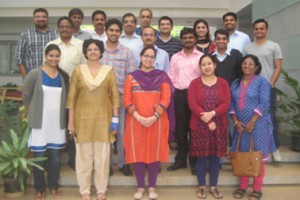2nd February 2015 Bangalore, India
Business models and routes to market
Guest blog by Dr Shailendra Vyakarnam is the Director of Centre for Entrepreneurship Learning, Judge Business School, University of Cambridge
The Indian biotech sector is set to grow. This has been clearly stated by the Dept. of Biotechnology and numerous agencies. Resources are being allocated for this purpose and the evidence of this can be seen when you visit the Centre for Cellular and Molecular Platforms (C-CAMP) on the campus of the National Centre for Biological Sciences (NCBS) in Bangalore.
In the latest initiative, Biotechnology Ignition Grant (BIG) from BIRAC, two annual recruitment rounds have been created, each attracting more than 100 young scientists and entrepreneurs with innovations to apply for BIG Awards and funding around 30-40 entrepreneurs. These are grants that enable nascent entrepreneurs to secure incubation and acceleration at several centres in India.
The Bangalore biotech cluster has connected with the biotech cluster of Cambridge (UK) under the auspices of the Bangalore Cambridge Innovation Network, a quiet attempt at bringing the entrepreneurial clusters together. BCIN was established two years ago to create dialogues that could lead to scientists and entrepreneurs in the two cities to start to talk to each other for mutual benefit. The has greatly supported the formation of this connect between both the ecosystems.
 Under the umbrella of BCIN, Taslim (Director at Centre for Cellular and Molecular Platforms, NCBS-TIFR) and I organized a one-day workshop at C-CAMP on 6 January for 16 scientists and entrepreneurs to work on clarifying their business proposition. It was a highly engaging and interactive workshop and the participants went beyond describing their work in scientific terms.
Under the umbrella of BCIN, Taslim (Director at Centre for Cellular and Molecular Platforms, NCBS-TIFR) and I organized a one-day workshop at C-CAMP on 6 January for 16 scientists and entrepreneurs to work on clarifying their business proposition. It was a highly engaging and interactive workshop and the participants went beyond describing their work in scientific terms.
The longer-term intent is that 5 of these entrepreneurs will go each year to Cambridge on the Ignite programme, especially where the innovation has global potential. But – the pilot workshop will be extended to reach out to more biotech entrepreneurs each year by hosting events in Bangalore.
The deeper aim is to get entrepreneurs and scientists fully prepared for investment and the market once the viability of the innovation has been established.
One of the critical outcomes of this pilot workshop is evidence that fostering networks that have depth will work. I am looking forward to working on more such activities in Bangalore in the future.
Selected feedback from participants
* It was indeed a brilliant session where all of us got an insight into the do’s and……. The participative sessions were indeed a good idea.
* It’s not every day that we get such insightful sessions that really motivates young entrepreneurs (and scares a bit at the same time I must admit), and I strongly feel that more young entrepreneurs ought to have their eyes opened to understand business models and realise what kind of path they wish to take
* What was very unique about the workshop was that it was very interactive and you were able to compare/ connect the east and western style of management
* It was an eye opener and what particularly made a difference is the interactions with other awardees.